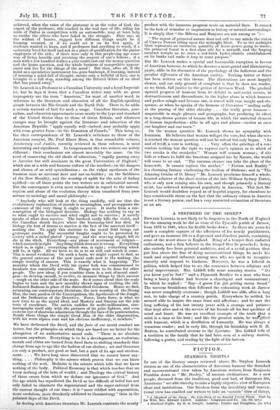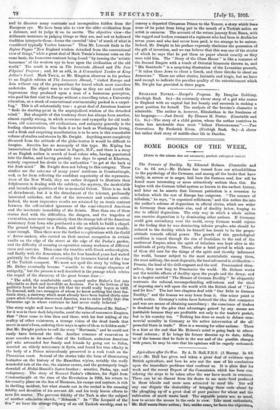FICTION.
STAMBOUL NIGHTS:1'
IN one of the literary essays reviewed above Mr. Stephen Leacock notices as one of the characteristics of American humour tho detached and unconventional view taken by American writers, from Benjamin Franklin down to " Mr., Dooley," of ancient civilizations. As a new people, divorced from the traditions, good and bad, of European life, Americans " are able thereby to take a highly objective view of European ideas and institutions. Our freedom from the hereditary and convcn. tional view has enabled our writers to take an outside' view of things, • A Shepherd of the Sleep: the Life-Story of an English Parish Priest. Told by Ma- Wife, lira. Edward Liddell. London : Longman and Co. IN., ad. net.) t Stain:nut Nights. By H. Dwight, London: Hodder and Stoughton. Ps. net.) and to discover many contrasts and incongruities hidden from the European eye. We have been able to view the older civilization from a distance, and to judge it on its merits. The objective view—the deliberate insistence in judging things as they are, and not as hallowed tradition interprets them—forms the essential' idea' of much of what is considered typically Yankee humour." Thus Mr. Leacook finds in the Biglow Papers "New England wisdom detached from the conventional view of things," while a great deal of Mark Twain's humour rests on the same basis, the humorous contrast being found " by turning the 'artistic innocence' of the western eye to bear upon the civilization of the old world." The result is seen in The Innocents Abroad and The New Pilgrims' Progress ; and, let us add, in A Connecticut Yankee at King Arthur's Court. Mark Twain, as Mr. Hingston observes in his preface to an English edition of The Innocents Abroad, " visited Europe and Asia without any of the preparations for travel which most travellers undertake. His object was to see things as they are and record the impressions they produced upon a man of a humorous perception, who paid his first visit to Europe without a travelling tutor, a University education, or a stock of conventional sentimentality packed in a carpet- bag." This is all substantially true : a great deal of American humour " finds its starting-pont in the unprejudiced wisdom of the detached mind." But alongside of this tendency there has always been another, almost equally strong, in which reverence and sympathy for old tradi- tions, old conventions, old civilizations, and antiquity generally is the leading characteristic. One finds it as far back as Washington Irving, and a fresh and surprising manifestation is to be seen in this remarkable volume of studies and stories by Mr. Dwight. Anything more completely divorced from the attitudo of the globe-trotter it would be difficult to imagine. America has no monopoly of this type. Mr. Kipling has immortalized the English variant in Pagett, M.P., and there is a story of an English author in search of local colour who, having penetrated into• the Sudan, and having precisely two days to spend at Khartum, naively expressed his- desire to the authorities "to get at the back of the Arab mind." Mr. Dwight does not belong to this category. These studies are the outccmo of many years' residence in Constantinople, and, so far from reflecting the confident superiority of the representa- tive& of the New World, they are rather designed to illustrate their helplessness in dealing with the subtlety, the mystery, the incalculable and ineradicable qualities of the immemorial Orient. There is no lack of detachment, but it is the detachment of the tolerant, profoundly interested onlooker, not that of the irreverent and cocksure critic. Indeed, the most impressive results are attained by an ironic contrast between the self-satisfied ignorance of. the semi-educated American and the inveterate immobility of the Asiatic. More than one of these stories deal with tho difficulties, the dangers, and the tragedies of excavation, none more impressively than the strange tale of the American missionary from Iowa who purchased a site on which to build a chapel. The ground belonged to a Pasha, and the negotiations were trouble- some enough. Then there were the further complications with the Guild o! Arrow-makers, who carried on their ancient occupation in certain vaults on the edge of the street at the edge of the Pasha's garden, and the difficulty of securing co-operation among workmen of different races and customs. Then came the troubles with Greek archaeologists. and finally with the Armenians, who for four hundred years had waited patiently for the chance of recovering the treasures buried at the time of the Turkish conquest. We must not spoil the story by telling how Mr. Bisbee eventually became " sensible to the strange eloquence of antiquity," but the process is well described in the passage which relates the sequel of the discovery of the great bronze door :— " The solid, the comfortable earth opened under Bisbee's feet into labyrinths as dark and incredible as Avernus. For in the bottom of his patriotic heart he had always felt that the world really began in 1.492. To descend, with two strangers of whom he knew nothing but their fan- tastic story, a stairway which must already have been buried thirty.nine years when Columbus discovered America, was to enter bodily that dim Saturnine age in whose existence he had never really believed."
The story might well have been called "The Education-of Mr. Bisbee," for it was in these dark labyrinths, amid the ruins of successive Empires, that " there came to him then and there, with his first inkling of the reality of other existences, a strange vision of the dead hands that move in men's lives, ordering their ways in spite of them to hidden ends." But Mr. Dwight prefers to call the story- "Mortmain," and he could not easily have bettered the title. Another romance of excavation is more macabre.in its mood—that of the brilliant, audacious American girl who astounded her family and friends by going out to Sidon, married an elderly missionary in Syria, and found her true affinity in the body of a Prince miraculously preserved in a rock tomb on the Phoenician coast. Several of the stories take the form of illuminating footnotes on the history of the Hamidian regime, notably the really wonderful tale of the rise, the sinister career, and the grotesquely tragic downfall of Abdul-Hamid's foster-brother : wrestler, Pasha, spy, and voluptuary. The story of Nousret Pasha's villainies, his flight from Constantinople at the time of the Revolution in 1908, his return to his country place on the Sea of Marmora, his escape and capture, is rich in thrilling incident, but what stands out in the recital is the amazing fidelity and devotion of his servant Ali. and his truly heroic efforts to save his master. The perverse fidelity of the Turk is also the subject of another admirable sketch, " Mehmish." In " The Leopard of the Sea " we have the strange Odyssey of an old Turkish warship, sent to
convey a deported Circassian Prince to the Yemen; a story which loses none of its point from being- put in the mouth of a Turkish sailor, an artist in omission. The account of the return journey from Basra, with the ragged and broken remnant of a regiment who had been in Arabia for seven years and who had never been paid, is too strange to be untrue. Indeed, Mr. Dwight in his preface expressly disclaims the possession of the gift of invention, and we can believe that this was one of the stories' of which he says that he put them on paper almost exactly as they were told him. The " Story of the Glass House " is like a romance of the Second Empire with a touch of Oriental bizarrerie thrown in, and- " His Beatitude " is a surprising illustration of the Levantine proverb, " It takes three Jews to cheat a Greek, and three Greeks to cheat an Armenian." There are other stories, fantastic and tragic, but we have said enough to indicate the peculiar quality of the entertainment which Mr. Dwight has provided in these pages.































 Previous page
Previous page